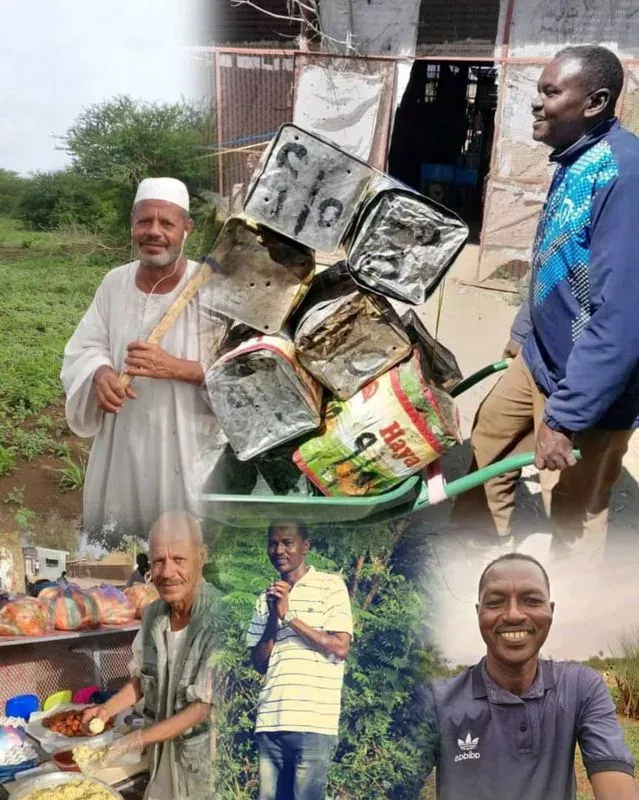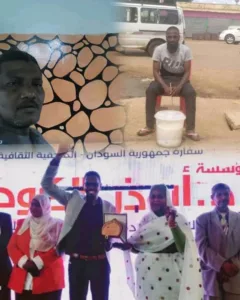Far from the “troublemaking profession”, journalists face the sufferings of life…!

The current war that has been imposed on the country has created a different reality for many media professionals and journalists who have chosen the “troublemaking profession.” After moving to certain states, they found themselves in certain professions in which they wrote about their owners… and their suffering. The war gave them a practical experience of their lives and being in the midst of suffering.
“1”
Abboud Abdel Rahim, the journalist who worked for Akhbar Al-Youm newspaper, tells his story, which he experienced in a new experience to cope with life's circumstances. He says: I created a new profession in which I found myself (selling credit), for which I worked for months, before leaving to do business in a modest shop for sale in front of my house in Perfume, and I felt closely the suffering of the citizen in Abboud's novel, and despite the exhaustion, I felt love for a profession other than journalism, an honorable job and a legal livelihood.
“2”
Broadcaster Muhammad Yahya Al-Rih Abu Dala' narrates after leaving the village of (Al-Haglig) east of Wad Madani (8) months because of the cursed war. After that, he settled in my place (in the land of the). sheikhs) (6) months, then I went to your Lord, where I worked in propaganda and advertising, and I did not continue due to the closure of the road to and from the other states from where these propaganda works come, after me. I thought of a new job, I decided to work in (selling barley juice) in search of a halal livelihood and to help my family, and I am still working in it until now, and I hope that after my suffering, this security, stability and peace for my beloved country.
“3”
Journalist Raqia Hassan wrote about her new profession outside of journalism: “I did not expect to find myself one day affiliated with a profession other than journalism in an educational institution,” Raqia Hassan continued. “I am far from my home country, I chose to seek… Any other profession, I belong to two educational institutions and I was interrupting my career for reasons. Last year, I applied for a position as an academic supervisor at the Dr. Abu Dhar Al-Kouda Foundation in Alexandria for his desire to accept this position, despite the obsession in me of the two previous experiences, but I was sure to find myself in this position and in this work, because there are people who like to present science in a real way despite the many challenges I faced, the most difficult of which was the war.
“4”
Photographer Abbas Ezzat says: “I was moved to Al-Jazeera, Al-Gadarif and Sennar, and I started as a farmer in the “Jungo” project without anyone’s help, due to limited means after the “5.” “For months, I harvested what I had sown and sold it for a small amount of money. After that, I returned to the east of the Nile via Hantoub, and that's where the militias occupied the city and I faced big problems. I cut the road to Fadasi, and from there I took a bus to Al-Hasahissa and from there to the east of the Nile, guarded by the protection of God, I started my career in the “Al-Ta'meya” industry, which borrowed its capital from my neighbor. Even though the situation has greatly improved, the interruption of services has been difficult for all of us. So I brought the tools of my new trade back to Gedaref, via Shindi, Atbara, Haya and Kassala, and I worked hard. and I collected money to renew my passport in order to travel outside the country after being accused of aiding the militia and started a war, and I felt threatened by some of those affiliated with the old regime, so I decided to leave the country for fear of my life. My life is here.
“5”
While his fellow journalist Mohamed Al-Jazouli tells his story after being displaced to his hometown in North Kordofan, in the village of “Um Nala”, and losing all his identity documents, work certificates, experience and household furniture. no better choice than to return to my roots, even though some advised me to go to the White Nile, the island, the Nile, the North, the Eastern States and others I rejected this idea because my heart wanted me to return to my family, so I decided to practice agriculture because I believe that my presence among my family is safe for me and for them, after breathing the smell of the “earth” in early autumn, which inspired me to cultivate after my absence So I got into debt because my bet on autumn was losing, due to the scarcity of rain at that time. So I looked for an alternative and ended up in bank transfers. I was faced with the problem of saving money, with people relying on some applications, so there was psychological suffering, even though the newspapers of the political movement and the Renaissance did not do so. Their owners abandoned us, especially Dr. Hassan Barqo, known for his humanitarian positions, and Muhammad Esmat, who kept asking about us, so Al-Zarqa newspaper resumed its publication, and Atef Al-Jamsi, the editor-in-chief, who remained my assistant during my ordeal. , and here I am back to the experience of agriculture, and I am filled with optimism that this year will be different and a favorable autumn, and I have become a farmer of millet, sesame and watermelon crops, which are about to be harvested. , and this is part of the lessons that war and displacement have taught us, and we have returned to the profession of our ancestors.
“7”
His colleague Abdel Aleem Makhawi recounts his suffering after the war and displacement, when he settled in Kosti with his brother Dr. Mamoun Makhawi says: “We did not know anyone and we were wandering everywhere looking for honest work. Even the money we had was not enough to enter the market as traders. Mamoun Makhawi worked on the porches, which we had difficulty driving after renting them. Then we were able to own a porch for the two of us, which reduced the cost of rent. We found a very good person in Al-Malja market in Kosti, and we found only cooperation, especially our uncle Ismail Abdel Rahman. He is one of the main businessmen in the market and we still work in front of his shop. The truth is that our livelihood comes from a small amount of money, and we thank God for that.” The most beautiful thing is that living from self-employment is a very great blessing, and we have clients who continue with us. located “near the workplace, which begins immediately after dawn prayer.”







